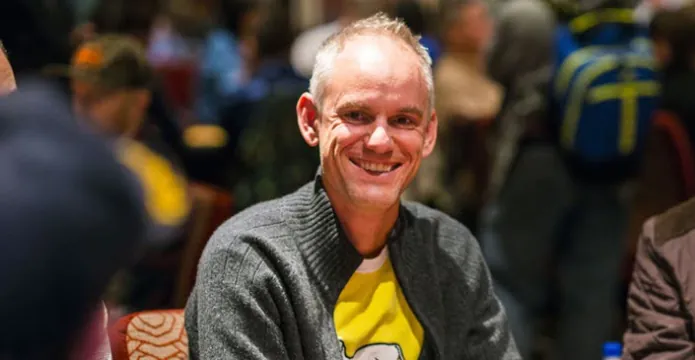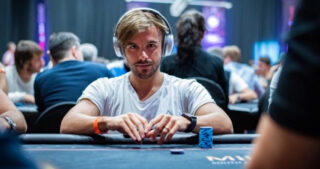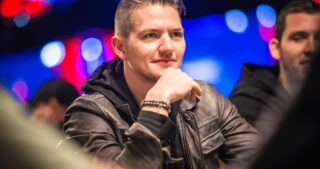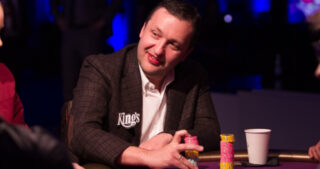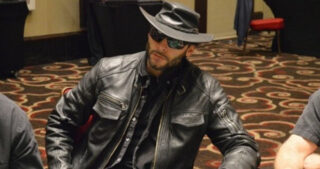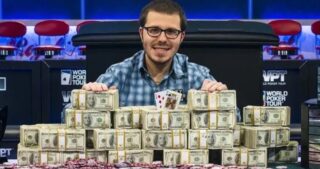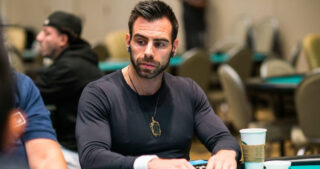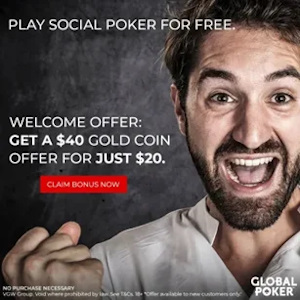Allen Cunningham, while perhaps not one of the most well-known members of Team Full Tilt, is certainly one of the most consistent. Respected, and feared, by those who are familiar with him, Allen employs a disciplined and analytic approach to the game the equal of which is difficult to find anywhere in the poker world.
Born in 1977 in Riverside, Calif., to parents Dean and Joanne Cunningham, Allen was introduced to poker at a young age, like so many others, by playing around the kitchen table. He has said that even then he realized he had a knack for card games, and while at the time he had to be content with beating his unsuspecting family members, he was itching for the day he would be old enough to step into a casino and test his skills against real opponents.
After high school Cunningham attended UCLA, where he pursued a degree in civil engineering. During this time he did get an education, but it wasn't in the classroom: it was at the poker table. While living with his parents and working as a pizza delivery boy, Cunningham spent his spare time at a local tribal casino and built up his bankroll playing low-limit cash games and freeroll tournaments. Though he enjoyed moderate success, poker was still a hobby - something to do for fun and to make a few bucks.
It was during his second year of college things began to click for Cunningham. He went on a rush, winning tournaments and beating cash games consistently. He used his newly inflated bankroll to jump from the $2-$4 game he was used to up to something a bit more substantial, $10-$20.
From that point on Cunningham was hooked. When he was still 19 years old, he dropped out of college, abandoning his degree program to play cards full-time. He was doing well for a teenager but his age was still an obstacle. Not being 21 meant he wasn't allowed to play in any of the non-tribal casinos where the real tournament action was going down. Grinding it out and constantly improving his game, Cunningham was again counting down the days before he could make the next jump in his poker career.
A slow start for Allen Cunningham
A hungry young player, he finally turned 21 and wasted no time in hitting the tournament trail. Cunningham's new-found occupation got off to somewhat of a slow start, though, when in his first year he was unable to get his foot in the door when it came to winning any of the major events he played.
Although Allen may not have been taking in the amount of money he would have liked, it was nonetheless an extremely formative period for him. Tournament poker was in the process of becoming the juggernaut it is today and Cunningham was fortunate enough to hook up with a few of the players who would soon become some of the best in the world.
Phil Ivey, John Juanda, Layne Flack and Daniel Negreanu, to name a few, were the company he kept. Much like the way in which No-Limit Hold'em was first pioneered by Seidel, Harrington, Lederer and Zolotow, who met at the infamous Mayfair Club in New York, this group of poker young guns took advantage of one another's knowledge of the game through endless discussions and semi-friendly competition.
It was in his second year Allen made the breakthrough he had been banking on. At the 1999 Legends of Poker at the Bicycle Casino in Los Angeles he had top ten finishes in a remarkable six tournaments, including two wins, which was enough to revitalize his bankroll and garner "Best All-Around Player" status. Over the next few years the tournament record that has marked Allen as one of the best began to take shape.
Just four months after crushing the tournaments at the Bike, Allen made an impressive showing at the U.S. Poker Championships, winning the Seven-Card Stud event and taking second in the $1,000 No-Limit Hold'em tourney.
The next summer at the 2000 World Series of Poker Cunningham proved again he was a much more mature player than his driver's license led people to believe. He managed to make it into the top twenty in five separate tournaments including a second-place finish in the $5,000 Omaha Hi-Lo event which earned him $113,850.
For the next year Allen placed consistently in smaller tournaments across the U.S. with a win at the L.A. Poker Classic being the highlight. The next summer Cunningham was back in Vegas and ready to play at the 2001 WSOP. This year marked another defining moment in the young player's career as he cashed in four separate tournaments. It was also the year Allen won his first World Series bracelet, defeating the field of 104 players in the $5,000 Seven-Card Stud event to take the title and the $200,000 cash prize.
By this time the poker world was starting to sit up and take notice of the mild-mannered young player who was cashing so consistently wherever he touched down. The 2002 World Series only cemented Cunningham's growing reputation when he took down his second bracelet, this time in the $5,000 Deuce-to-Seven No-Limit category. Along with the win he also managed four other solid cashes.
2003 was another productive year for Cunningham as he came painfully close to his third WSOP bracelet in the $5,000 No-Limit Deuce-to-Seven Draw event. He was unable to finish, however, overcome by O'Neil Longson in heads-up play.
Cunningham would eventually succeed in getting that third bracelet, but it was a full two years before he would be able to do so. In the 2005 $1,500 No-Limit Hold'em tournament, he ran over an astounding 2,305 entrants including a minefield final table stacked with the likes of Scott Fischman, Dave "Devilfish" Ulliott, Liz Lieu and Can Kim Hua for the win. It was not only a huge payday for Cunningham but also a monumental WSOP on the whole as he final-tabled in a remarkable four events, making him - at the time - the only player to win more than a million dollars before the Main Event even began.
It's hard to believe he could outdo himself after a performance like that, but in 2006, he somehow found a way. In the $1,000 No-Limit Hold'em event, he outlasted 752 entrants and a staggering 1,670 re-buys to take his fourth bracelet and a cool $625,000. This may seem like accomplishment enough for one WSOP but Cunningham wasn't finished just yet; he still had two final tables left in him.
In the $5,000 No-Limit Deuce-to-Seven Draw Lowball tourney he made it to sixth place before being eliminated by fellow pro David Williams and in the biggest poker tournament ever played - the Main Event - he did it again. Almost 9,000 players registered for this tournament and miraculously, Cunningham outlasted almost all of them. Coming into the final table second in chips with $17.7 million to winner Jamie Gold's $26.6 million, he was ready for the biggest game of his life.
In an interview with PokerListings.com the day before the final table Cunningham put his chances for a victory at 40%, not expressing a whole lot of respect for the amateur chip leader. Despite his best efforts though he would be knocked out in fourth place and receive a paltry $3.6 million for his trouble. Money aside, the title was much more important to Cunningham. Dejected, Allen left the Rio Casino, refusing to speak with either media or fans.
One thing is certain, Cunningham still has a lot of poker left in him. Recently voted the best player under the age of 35 by his peers, Allen is still firmly committed to improving himself as a player.
Case in point, the 2007 WSOP, where he picked up a fifth bracelet in $5,000 Pot-Limit Hold'em for nearly half a million dollars.
Convinced his game has progressed with each passing year, Cunningham's most valuable asset may be his unwavering discipline. Unlike many big name players, his presence at the table is psychological and usually unemotional, as he's most commonly noticed only when raking in a massive pile of another player's chips.
Allen is currently involved with fellow poker pro Melissa Hayden with whom he travels the tournament circuit. They live together in Las Vegas with their dog Muffin.
Player Analysis
Allen is a thinking player who reminds me of Erik Seidel. Like Erik, he doesn’t do anything to bring attention to himself. He only gets noticed when he wins, which he has done quite regularly over the past few years. Allen was the 2005 World Series Toyota Points leader with his four final table appearances including one win.




